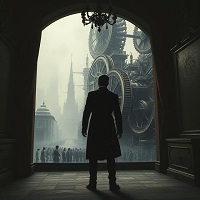 "Adjustment Team" presents us with one of those ephemeral whispers from the ether that Philip K. Dick, that most unreliable and fascinating of narrators, occasionally permitted us to overhear. To approach this tale is not merely to read a story, but to submit to a peculiar sort of psychic vivisection, a gentle but firm probing into the very fabric of one's perceived reality. It is a work that, like a particularly potent opiate, initially beguiles with a semblance of the mundane before revealing the grotesque machinery that grinds beneath the surface of our reassuringly dull existence.
"Adjustment Team" presents us with one of those ephemeral whispers from the ether that Philip K. Dick, that most unreliable and fascinating of narrators, occasionally permitted us to overhear. To approach this tale is not merely to read a story, but to submit to a peculiar sort of psychic vivisection, a gentle but firm probing into the very fabric of one's perceived reality. It is a work that, like a particularly potent opiate, initially beguiles with a semblance of the mundane before revealing the grotesque machinery that grinds beneath the surface of our reassuringly dull existence.
 Philip K. Dick understood in 1954 what we refuse to admit in 2025: passivity enables fascism. "Exhibit Piece" is about George Miller, a historian who loves the past so much he retreats into it, choosing a curated fantasy over participating in the real world's struggles. And what do we do in 2025? We watch democracy crumble. We observe rights disappear. We spectate at our own oppression and doom. Miller thinks he's escaped a totalitarian future by fleeing to the free past. He hasn't. He's chosen the comfortable chair and cold beer while reading headlines about total world destruction. And doing nothing.
Philip K. Dick understood in 1954 what we refuse to admit in 2025: passivity enables fascism. "Exhibit Piece" is about George Miller, a historian who loves the past so much he retreats into it, choosing a curated fantasy over participating in the real world's struggles. And what do we do in 2025? We watch democracy crumble. We observe rights disappear. We spectate at our own oppression and doom. Miller thinks he's escaped a totalitarian future by fleeing to the free past. He hasn't. He's chosen the comfortable chair and cold beer while reading headlines about total world destruction. And doing nothing.
 The apocalypse is always breakfast time somewhere. This is the truth Philip K. Dick discovered in 1953, writing pulp fiction for grocery money while America pretended the Korean War was a distant concern and nuclear annihilation a theoretical problem. "Breakfast at Twilight" forces us to see what we have been ignoring: that peace is not the opposite of war but merely distance from it, and that distance is not geography but privilege. The soldiers surrounding the Pritchett family's dining table are not from the future. They are from every place we refuse to look. I argue that Dick wrote not prophecy but reportage.
The apocalypse is always breakfast time somewhere. This is the truth Philip K. Dick discovered in 1953, writing pulp fiction for grocery money while America pretended the Korean War was a distant concern and nuclear annihilation a theoretical problem. "Breakfast at Twilight" forces us to see what we have been ignoring: that peace is not the opposite of war but merely distance from it, and that distance is not geography but privilege. The soldiers surrounding the Pritchett family's dining table are not from the future. They are from every place we refuse to look. I argue that Dick wrote not prophecy but reportage.
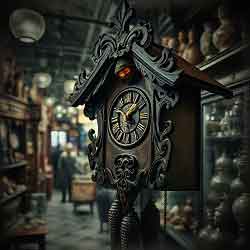
To be brief is not a failing.
This should be obvious, but it apparently requires stating: brevity is not the enemy of depth, compression is not the symptom of insufficiency, and a three-thousand-word story can be as complete as a three-hundred-page novel. Philip K. Dick's "Beyond the Door" (1953) proves this. What follows is a defense of the indefensible: that a story about a homicidal cuckoo clock, written for a pulp magazine that paid seventy-five dollars, might actually be perfect.
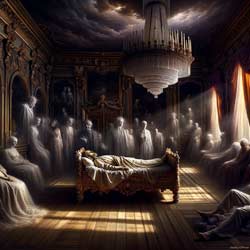 Dive into the profound narrative sea of "The Death of Ivan Ilyich" by Leo Tolstoy, where every word echoes the cold, inevitable truth of mortality. Our critique unveils the rich tapestry of existential contemplation and the stark reality of societal superficiality within Tolstoy's masterpiece. Engage with a review that sails through the solemn yet enlightening voyage of Ivan Ilyich, exploring the depths of life’s ephemeral nature against the eternal silence of death. Discover why this narrative remains an unyielding mirror to our own existence.
Dive into the profound narrative sea of "The Death of Ivan Ilyich" by Leo Tolstoy, where every word echoes the cold, inevitable truth of mortality. Our critique unveils the rich tapestry of existential contemplation and the stark reality of societal superficiality within Tolstoy's masterpiece. Engage with a review that sails through the solemn yet enlightening voyage of Ivan Ilyich, exploring the depths of life’s ephemeral nature against the eternal silence of death. Discover why this narrative remains an unyielding mirror to our own existence.
 In the veiled and shadowy realm of science fiction, few stars burn as fiercely or as enigmatically as the mind of Philip K. Dick. A master of the bizarre and the unsettling, Dick’s pen sketches realms unknown yet eerily familiar, with "Beyond Lies the Wub" being no exception to his morbidly curious exploration of the human psyche. The tale unfolds on the rusty Martian plains, where a peculiar creature, the Wub, becomes the unbidden guest aboard a human spaceship, setting the stage for a narrative that is both grotesque and philosophically tantalizing.
In the veiled and shadowy realm of science fiction, few stars burn as fiercely or as enigmatically as the mind of Philip K. Dick. A master of the bizarre and the unsettling, Dick’s pen sketches realms unknown yet eerily familiar, with "Beyond Lies the Wub" being no exception to his morbidly curious exploration of the human psyche. The tale unfolds on the rusty Martian plains, where a peculiar creature, the Wub, becomes the unbidden guest aboard a human spaceship, setting the stage for a narrative that is both grotesque and philosophically tantalizing.
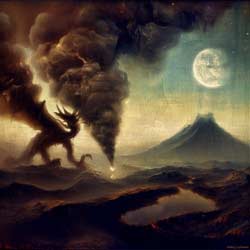 In the shadowy realm of Lovecraftian literature, "The Slaying of the Monster," a collaboration between H.P. Lovecraft and R.H. Barlow, emerges as a tale of grotesque horror and profound regret. The narrative unfurls in an ancient, forsaken castle, where a monstrous entity is rumored to dwell. A band of hunters, driven by fear and ignorance, embark on a perilous quest to exterminate this creature, only to discover the tragic truth too late. The 'monster' they sought to destroy was, in fact, a grotesquely deformed man, living in solitude and despair. The hunters' remorse echoes in the chilling winds of the castle, a haunting testament to their misguided actions.
In the shadowy realm of Lovecraftian literature, "The Slaying of the Monster," a collaboration between H.P. Lovecraft and R.H. Barlow, emerges as a tale of grotesque horror and profound regret. The narrative unfurls in an ancient, forsaken castle, where a monstrous entity is rumored to dwell. A band of hunters, driven by fear and ignorance, embark on a perilous quest to exterminate this creature, only to discover the tragic truth too late. The 'monster' they sought to destroy was, in fact, a grotesquely deformed man, living in solitude and despair. The hunters' remorse echoes in the chilling winds of the castle, a haunting testament to their misguided actions.
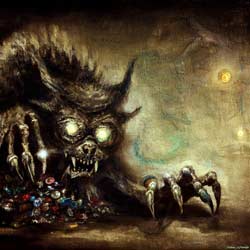 Among the manifold works of H.P. Lovecraft, the master of cosmic horror and weird fiction, there is one that stands out as a curious and anomalous specimen: a tale of whimsy and irony, co-authored with his youthful friend R.H. Barlow. This story, unlike most of Lovecraft’s tales, is a humorous and ironic parody of the typical fantasy adventure, in which a greedy and ambitious wizard-auditor named Yalden seeks to plunder the treasure of a mysterious and powerful necromancer named Anathas. This review will examine the story’s origins, themes, symbolism, reception, and significance.
Among the manifold works of H.P. Lovecraft, the master of cosmic horror and weird fiction, there is one that stands out as a curious and anomalous specimen: a tale of whimsy and irony, co-authored with his youthful friend R.H. Barlow. This story, unlike most of Lovecraft’s tales, is a humorous and ironic parody of the typical fantasy adventure, in which a greedy and ambitious wizard-auditor named Yalden seeks to plunder the treasure of a mysterious and powerful necromancer named Anathas. This review will examine the story’s origins, themes, symbolism, reception, and significance.
- Lovecraft - Old Bugs
- Lovecraft - The Mysterious Ship
- Lovecraft - The Mystery of the Grave-Yard
- Lovecraft - The Secret Cave
- Lovecraft - The Little Glass Bottle
- Lovecraft - The Transition of Juan Romero
- Lovecraft - Sweet Ermengarde
- Lovecraft - The Dream-Quest of Unknown Kadath
- Lovecraft - The Mound
- Lovecraft - The Case of Charles Dexter Ward






